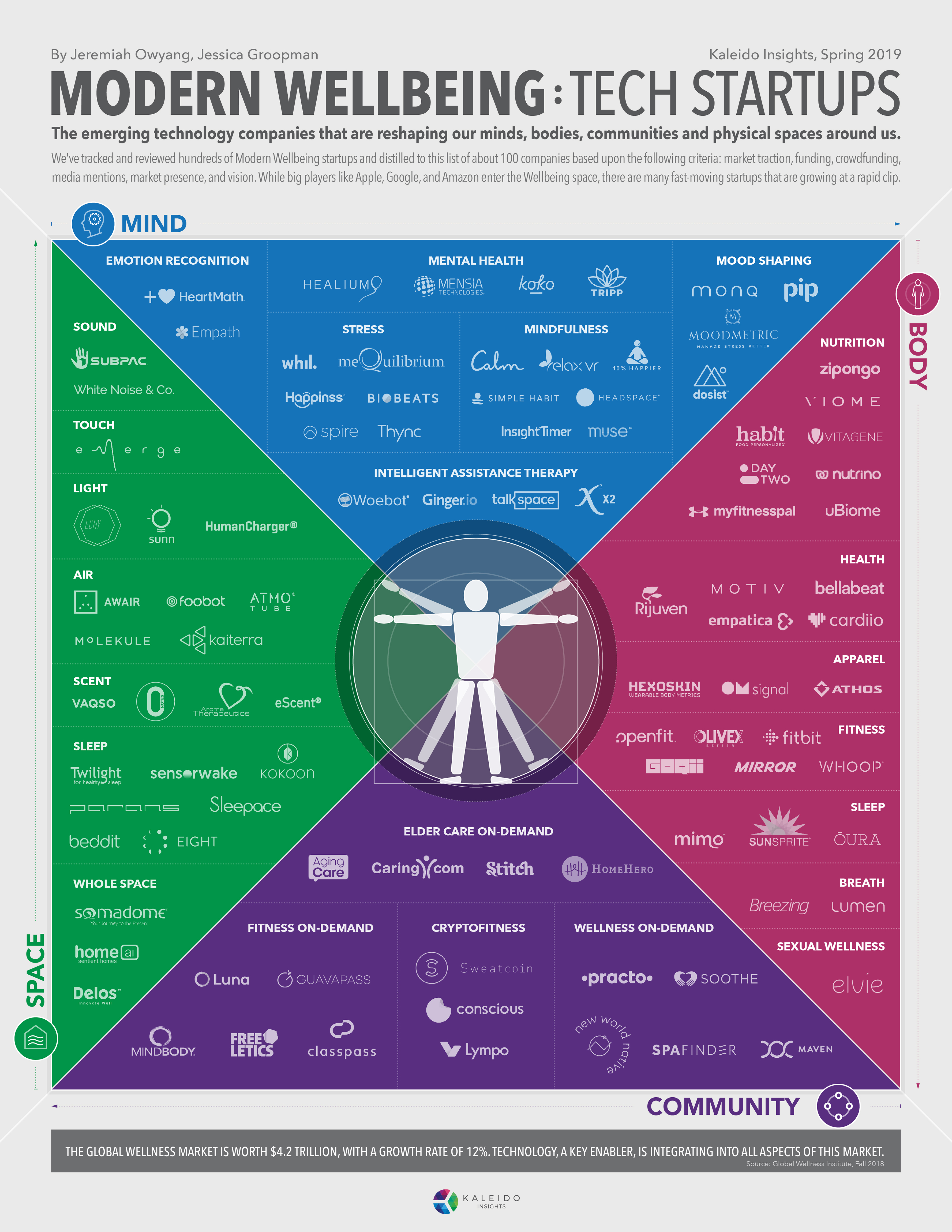
A new market has emerged. Technology has intersected with our wellness to aid in monitoring, promoting, augmenting and managing our well-being. These low-cost technologies are transforming the field, making tools for managing wellness accessible to anyone who wants to adopt them. This stands in stark contrast to the way the current, traditional health industry approaches health and wellness, by requiring traditional practitioners, insurance, and a wide range of costs.
Users are turning to technology to supplement their diet, to develop their mind, aid their fitness, their sleep, and their reproductive health, improve the design of their environment and much more. Using these new tools, they’re not approaching wellness in a vacuum the offerings typically involve supportive digital communities that help people share information, access other online and real-world communities, and grow and share the experience as a collective.
Throughout my career as an industry analyst, I’ve identified power shifts resulting from technology and helped to explain what they’ve meant to the world. I did this with the social media industry over a decade ago and the sharing /collaborative economy 5 years ago. Now I see a similar pattern yet again. In each of these phases, consumer-grade technology empowered people to get what they needed for things that formerly would have required them to rely on traditional institutions.

Above Funding Chart based on research by Kaleido Insights.
The graphic identifies the large number of emerging technology companies that are reshaping our minds, bodies, communities and the physical spaces around us. After reviewing about five hundred startups, we distilled them down to this list of about 100 companies based upon the following criteria: market traction, amount of funding or crowdfunding, media mentions, market presence and quality of vision.
I admit that these startups are mostly from the Western world. However, there are also a vast number of technologies emerging in Asia and (soon-to-be) Africa that aren’t yet fully represented.
Investment in this space is heating up, with companies having received over $2B in current funding. Acquisitions are already popping up Under Armour acquired diet management app MyFitnessPal and Apple acquired sleep-monitoring device Beddit. Just last month, the meditation-focused app company Calm raised an additional $88M, for a total of $116M, cementing themselves as a prominent unicorn in this market, valued at over $1B.

Above image, Registered Nursing.org
THE NEED:
Rising healthcare costs are a major issue. A significant number of people who are aging or have health woes cannot afford to see medical professionals on a frequent basis. These emerging startups provide an avenue to help them take control of their lives in a more affordable way. These technologies give users assistance in achieving overall wellness and help them take proactive measures for a healthy lifestyle.
THE NEED:
Rising healthcare costs are a major issue. A significant number of people who are aging or have health woes cannot afford to see medical professionals on a frequent basis. These emerging startups provide an avenue to help them take control of their lives in a more affordable way. These technologies give users assistance in achieving wellness and help them take proactive measures for a healthy lifestyle.
UPSIDES AND OPPORTUNITY:
People will be able to improve their physical, mental and spiritual well-being at a low cost. We expect soon to see personalized digital therapists, dietitians and doctors.
DOWNSIDES:
Who controls the data? It’s not clear. Where will that data be used? Could a startup be acquired by an insurance company, pharmaceutical company, of sold to foreign actors? Risks around the control of personal health data is an important potential drawback to consider as this industry grows. Will a future artificial intelligence have enough information to predict your health journey or even your death, based on historical data correlated with millions of others? Will humans become addicted to these technologies as we have become to social networks? Will future dating websites, for example, emerge that match healthy people with healthy people, making the dystopian visions of the movie Gattica becomes into reality?
THE FUTURE:
We expect to see a lot of growth especially in the Community category and around AI, creating digital virtual assistants for wellness and the like. And when a recession hits, this market will boom. In a period of stress, people will be struggling to find their mental balance, health and fitness but won’t have the funds to support traditional methods. As the anticipated recession engulfs the globe, expect people who have lost employer-provided healthcare to turn to lower-cost or freemium versions of wellness solutions.
Modern wellness is here. Expect a cultural shift in how we manage our wellbeing our minds and bodies. To support this shift, more and more startups will continue to appear. We’re in for a ride expect to become a better person by the end of it. And yes, we can’t overlook the irony that we’re turning to technology to find peace of mind.
This post first appeared on the Technomy website.